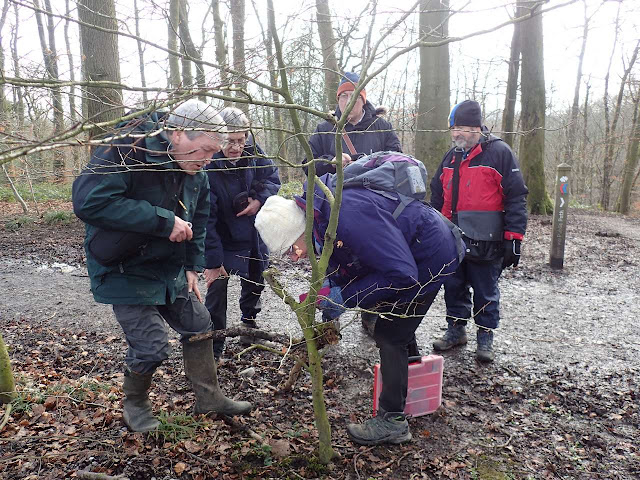Delight in the Natural World:- This eco-blog by Judith Allinson features:* Settle Wildflower Walks * The Rainforest Fund * Rainforest Issues * Fundraising Ideas * Nature Conservation * Grasses, Mosses, Lichens and Algae * Settle * St John's Methodist Church and Hall, N Yorks * - Started on 1 Jan 2008
Sunday, 29 March 2020
Sesleria caerulea Blue Moor-grass at Winskill Stones Plantlife reserve
March, April and Blue Moor-grass out now adorning the rocky limestone slopes above above Settle and Langcliffe with its, yes, blue flowers. The grass stems are still very short, but they will grow rapidly. In Langcliffe and Settle we are lucky the limestone cliffs are in within easy walking distance. (This picture was taken on 23 March)
Blue Moor-grass is easy to identify because it is the only grass in flower in March and early April - apart from Annual Meadow-grass which flowers all year and Good Friday Grass - which is really a Woodrush -Luzula campestris.
These photos were taken at the Plantlife Reserve: Winskill Stones
The Blue Moor-grass is in the mid distance.
In the foreground on the limestone rocks is the marmalade coloured lichen Caloplaca flavescens, and capping the rock are huge patches of white Aspicilia calcarea
Friday, 13 March 2020
SD86 - 10b - SD8160b - Lichens at Mearbeck
 |
| Settle Junction |
If I revisit this square, with another 11 species (total 29) I will be able to make the square turn light orange. (29-40 is light orange)
The A65 is a very busy narrow dangerous road, so best not surveyed. I park next to the railway bridge below Mearbeck House.
I study the lichens on the flat metal top surface of the parapet of the railway bridge. I wave to two trains going past. A police van stops on the main road but before I can walk up and cross the busy road to explain what I am doing the van leaves.
 |
| Physcia adscendens |
 |
| Candelariella vitellina on bridge parapet |
I record Physcia adscendens, Phiscia dubia and a brown Melanahalea. Hypotrachyna revoluta (?) and take photos of Candelariella vitellina, and an unknown with black dots. (There is some Parmelia saxatilis but I have already recorded that before).
 |
| Looking south. See the two dark coloured lumps to the far left and right on the bridge top. they have a dark lichen with dark dots. In the foreground is Hypotrachyna revoluta |
 |
| Hypotrachyna revoluta |
 |
| With black dots |
The pillar at the end of the bridge has a fine limestone capstone with fossils. Its surface is covered with Caloplaca flavescens, with a lemon yellow more powdery Caloplaca citrina on the sides

The old wooden post next to it has Trapeleoplsis flexuousa.
 |
| Trapeleoplsis flexuousa. |
 |
| Trapeleopsis flexuosa. |
 |
| and Candellariella vitellina |

 |
| Not sure |
 |
| The same, just closer |
Well that gets us five new named lichens, and two no idea.
------------------------
Back over the noisy A65, the private drive up to Mearbeck is lined with parkland oak trees. It is a very windswept area.(receiving wind from industrial Lancashire and West Yorkshire in the past). The trees near the A65 will receive their quota of car fume pollution.I discover five new lichens.
But as far as my list goes I am not totally sure of any of their names. So not much use as far as changing my yellow square ot pale orange.
I look at the first tree trunk: A lichen with a thick grey thallus and with black dots;


 |
| Phaeophyscia orbicularis |

Phaeophyscia orbicularis -camouflaged
Below: A lichen in a big white patch on the trunk: either a Pertusaria or Phlyctis
 |
| K turned yellow then red - so maybe Phlyctis argena. But there was only one patch of it. with Phaeophyscia orbicularis above |
 |
| K turned yellow then red - so maybe Phlyctis argena. But there was only one patch of it. |
On the north side of the trunk is a yellowish greenish powdery lichen on the ridges. and with a pastel greenish granular lichen in the cracks. If only they could be Chrysothrix candelaris and Calicium viride.. but I see no pin heads. Much more likely to be an alga and some form of Lepraria


Ah well, may be I will have time to look at the specimens I brought back in envelopes later, and work out names.
Wednesday, 4 March 2020
Skipton Woods: Mid Yorkshire Fungus Group visit March 2020
Setting off for Skipton Woods on 4 March, with Pup.

 |
| Peniophora ?limitata |
 |
| Peniophora ?limitata |
 |
| Hypoxylon fuscum (hazel woodwart) |
 |
| Hypoxylon fuscum (hazel woodwart) |
 |
| Tubaria |
 |
| err... |
 |
| Exidia albida |
 |
| This looks as if it has a smooth white mat surface.. but with a hand lens you see tiny pores.. |
 |
| It looks like this (awaiting name) |
 |
| Awaiting name |
 |
| Awaiting name close up |
 |
| Schizopora paradoxa |
 |
| Insect and millepede on Stereum sp . |
 |
| Sulphur tuft - Hypholoma fasciculare --Sulphur Tuft - early in year so gills not yet very dark. |
 |
| Lachnum virgineum - Stalked hairy fairy cup |
 |
| Looking at Lachnum virgineum - Stalked hairy fairy cup |
 |
| Mycena purpurofusca - the Purple Edge Bonnet |
 |
| Mycena purpurofusca |
 |
| Moth larva in bramble leaf |
 |
| Elf Cup |
 |
| This beech nut shell was stuck to the twig with a fungus |
The group goes some where in or near Craven (Ingleton to Otley!) on the first Wednesday morning of every month. Interested in coming?
Subscribe to:
Comments (Atom)









